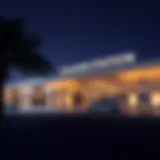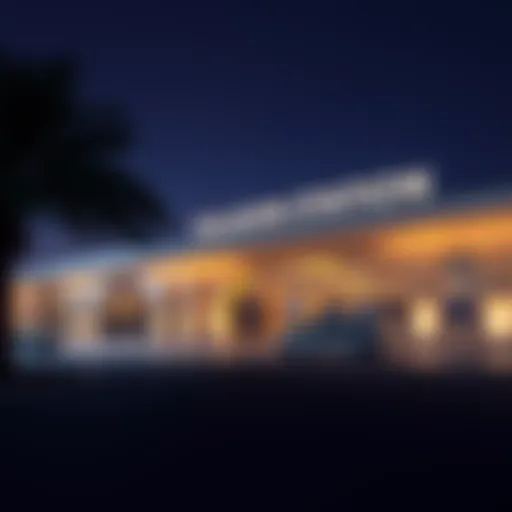Iftar in Dubai Today: A Complete Insight
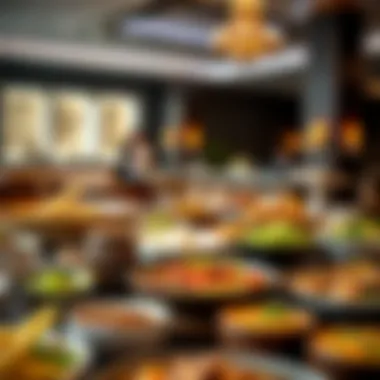
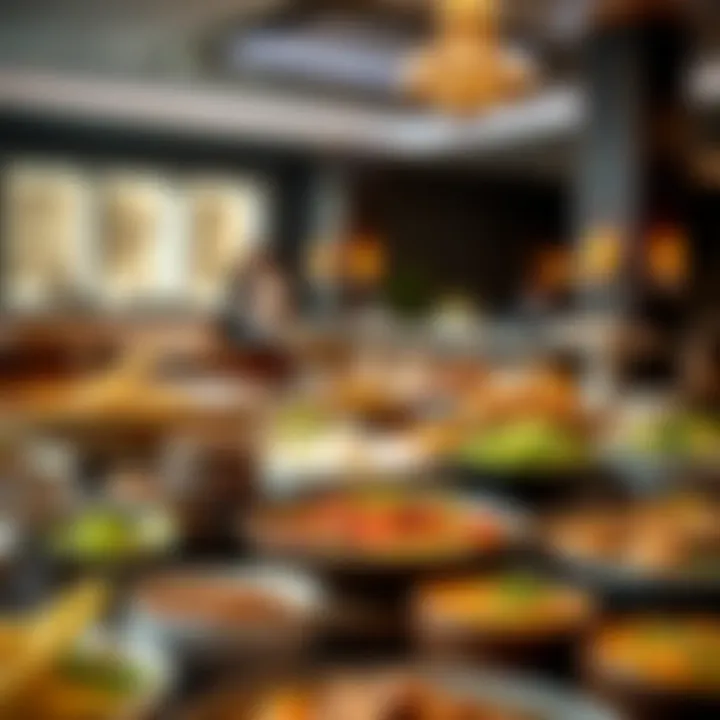
Intro
Iftar in Dubai is not merely a meal; it’s an experience laden with cultural heritage and modern flair. Each evening during Ramadan, as the call to prayer echoes through the bustling streets, families, friends, and strangers come together to break their fast. The anticipation is palpable, and the atmosphere buzzes with excitement, making iftar a time of connection and celebration.
Dubai's iftar scene reflects its historical roots while embracing contemporary culinary innovations. From lavish hotel buffets to intimate gatherings in homes, the variety of offerings creates a tapestry of flavors that caters to both local and expatriate communities.
What sets Dubai apart is its unique ability to blend tradition and modernity. Whether it's savoring traditional dates and mint lemonade or indulging in gourmet dishes from around the world, the choices are vast. The city hosts extravagant iftar events in iconic landmarks, setting the stage for lavish displays of food that rival the best dining experiences globally.
As we explore the cultural significance, culinary wonders, and vibrant venues of iftar, this guide aims to educate and celebrate the essence of breaking fast in this spectacular city. In doing so, it captures the spirit of Ramadan and its pivotal role in fostering community.
Ultimately, iftar in Dubai is a reflection of its heart and soul—a dance of flavors and traditions that ignites the senses and brings people together.
The Context of Iftar in Dubai
Iftar in Dubai is more than just a meal that breaks the fast; it’s a profound reflection of the city’s rich cultural tapestry and a celebration of community spirit. The month of Ramadan transforms Dubai into a vibrant hub of showing compassion, hospitality, and unity among both locals and expatriates.
Understanding Iftar
Iftar, which literally means "to break the fast," occurs at sunset during Ramadan and serves as a sacred time for Muslims to nourish themselves after a long day of fasting. This moment is marked with spiritual significance, as families and friends come together to share food, laughter, and stories. The meal typically starts with the eating of dates and drinking of water or milk, following the Sunnah of the Prophet Muhammad.
As the sun dips below the horizon, the food spread often includes a combination of traditional and contemporary dishes, embodying the diverse culinary scene of Dubai. This meal plays a crucial role in promoting social bonds and reinforcing the values of sharing and gratitude in a society that thrives on multicultural coexistence. An iftar isn’t merely a routine; it’s an experience that binds people together and invites everyone to partake, regardless of their religious beliefs.
Cultural Importance During Ramadan
The cultural significance of iftar during Ramadan can’t be overstated. It’s a time that promotes inclusivity and compassion. Here, people not only satisfy their physical hunger but also experience moments of deeper connection with their community and faith. The essence of Ramadan is reflected in the act of sharing meals with the less fortunate, often seen through community-driven initiatives where free iftar meals are provided in public spaces.
Iftar in Dubai is also a showcase of the city’s modernity and traditions coexisting harmoniously. The bustling food markets and sumptuous buffets in luxury hotels serve offerings that cater to a multitude of tastes and preferences. This melding of traditions goes beyond culinary aspects; it generates an atmosphere of festivity that radiates through the very core of society. Engaging in these practices reinforces social ties and allows for the opportunity to bond with family, friends, and even strangers.
As residents and tourists navigate through the divine spirit of Ramadan, iftar serves as a gentle reminder of the importance of faith, family, and compassion. Whether it’s enjoying a lavish buffet or a simple meal together, the experience of iftar in Dubai remains unique—infused with rich flavors, smiles, and a sense of belonging that touches everyone who participates.
"Iftar is not just a meal; it’s a moment where the heart finds warmth through shared experiences and cherished connections."
Understanding these layers behind iftar gives insight into Dubai’s social fabric and enhances appreciation for the cultural dimensions prevalent throughout this holy month.
Culinary Offerings at Iftar
The breaking of fast during Ramadan, known as Iftar, is much more than simple sustenance; it's a deeply rooted tradition that showcases the rich culinary landscape of Dubai. During this time, food serves as a medium that connects families, friends, and communities. The offerings available at Iftar reflect a unique blend of heritage and innovation, making each meal an experience worth savoring. Understanding the variety in culinary offerings not only highlights the significance of tradition but also emphasizes the social fabric that is strengthened through shared meals.
Traditional Dishes to Experience
When you step into an Iftar setting, the aroma wafting through the air is likely to be an unmistakable invitation. Traditionally, dates and water are often the first to welcome you. This ritual, rooted in the teachings of the Prophet Muhammad, symbolizes nourishment and spirituality.
Following this initial choice, one might find themselves enjoying dishes such as Harees, a slow-cooked mixture of wheat and meat seasoned with spices. Another staple is Fattoush, a refreshing salad that combines crispy vegetables and toasted pita bread, offering a crunch that delights the palate.
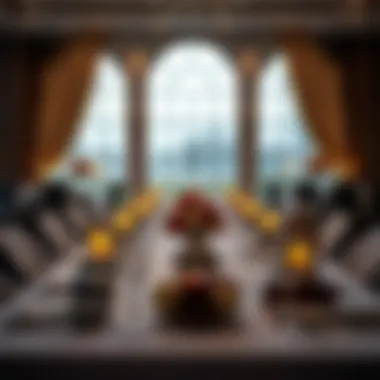
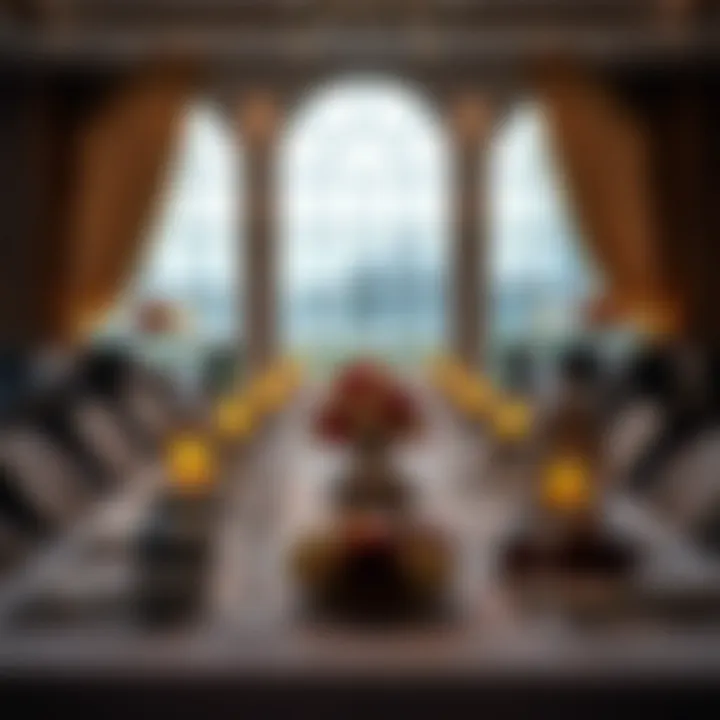
Additionally, don't overlook Samboosa, a fried pastry filled with spiced meat or vegetables. These bites are especially popular and embody both flavor and tradition.
Furthermore, Mandi, a fragrant dish of rice and marinated meat, often served with nuts and raisins, truly captures the essence of Arabian cuisine. Each region in Dubai may bring its own flair to these offerings, adding local influences and seasonings that give each dish a unique touch.
Modern Twists on Classic Meals
In recent years, the culinary scene during Iftar has taken on a contemporary flair that marries tradition with innovation. Chefs have begun to interpret classic dishes in new ways, resulting in creations that are not only visually appealing but also bursting with flavor.
For instance, deconstructed Fattoush or Samboosa with avant-garde fillings such as truffle-infused cheese showcase a creative leap from established recipes. You might also encounter lavish Iftar buffets at upscale hotels where traditional dishes are presented alongside gourmet twists like saffron-infused risotto or herb-crusted lamb, illustrating how far culinary boundaries have been pushed.
Moreover, the rise of health consciousness has led to options such as gluten-free Harees and vegan-friendly Mandi, allowing a broader audience to partake in Iftar festivities. It’s clear that modern chefs in Dubai are not afraid to break the mold while still respecting the time-honored traditions that define the Iftar experience.
Popular Iftar Beverages
No Iftar would feel complete without refreshing beverages that hydrate and invigorate after a long day of fasting. Traditional drinks like Qamar al-Din, a sweet apricot syrup drink, are prevalent and often enjoyed chilled. Another common choice is Tamarind juice, offering a tangy and sweet flavor that pairs well with savory dishes.
In recent years, Dubai's diverse expat community has introduced an array of beverages ranging from freshly squeezed juices to handmade smoothies, catering to varying tastes and preferences. For those seeking something with a kick, non-alcoholic options like mocktails have gained traction, presenting a festive flair that fits perfectly into the celebratory atmosphere of Iftar.
To encapsulate the experience, Cardamom-infused coffee or mint tea energizes diners, providing a culturally rich end to the meal. The emphasis on beverages during Iftar is not just about quenching thirst; it enhances the overall dining experience, creating moments of togetherness and joy as individuals break bread and sip together.
As we explore the culinary offerings at Iftar in Dubai, it's evident that this event serves as a bridge linking past to present, tradition to innovation, and individual to community. It invites us all to gather around the table—and that is where the magic truly happens.
Locations for Iftar in Dubai
Iftar in Dubai is more than just a meal; it's a communal experience that reflects the city’s unique position at the crossroads of tradition and modernity. Choosing the right location to break your fast can greatly enhance this experience, as the ambiance and culinary offerings play a crucial role in how one engages with Ramadan.
Top Restaurants Offering Iftar
In Dubai, the list of restaurants that cater to iftar is as diverse as the population itself. High-end venues, traditional eateries, and casual spots all offer unique dining experiences. Among these, some standout places include:
- Al Fanar Restaurant & Cafe: This spot provides an authentic taste of Emirati cuisine. Its ambiance mirrors the Dubai of yesteryears, with a decor that pays homage to the heritage while serving classic iftar dishes.
- Eauzone: Located by the beach, it offers patrons the chance to break their fast with a picturesque view. Its menu features an exquisite selection of gourmet dishes along with an extensive drinks option.
- At.mosphere: Situated on the 122nd floor of the Burj Khalifa, this restaurant is perfect for those wanting to add some height to their iftar experience. The panoramic views are bound to make the evening memorable.
Dining in these venues often comes with special iftar menus that allow for a mix of traditional and modern dishes. Reservations are usually needed, especially during the peak of Ramadan, to secure a spot.
Unique Outdoor Iftar Experiences
Outdoor iftar experiences in Dubai can offer a refreshing change compared to typical indoor settings. As the sun sets, many establishments and hotels set up beautifully adorned tents or al fresco dining spaces curated just for this season. Some notable outdoor options include:
- The Dubai Marina: Various waterfront eateries set up tables along the promenade, allowing diners to enjoy gentle breezes while partaking in their meals.
- Saeed Al Maktoum House: This historical venue provides an enchanting backdrop for those seeking a more cultural outdoor experience, often featuring traditional music and performances.
- Desert Safari Iftar: For an adventurous twist, some tour companies offer iftar experiences in the desert. Guests can break their fast under the stars, enjoying a traditional meal amidst sandy dunes and camels.
These outdoor settings not only offer good food but also provide an atmosphere that emphasizes the community aspect of Ramadan, where families and friends gather together.
Community Iftar Gatherings
Community gatherings around iftar highlight the spirit of solidarity and sharing during Ramadan. Various locations across Dubai, from mosques to public parks, organize group meals that are open to all. Notable details include:
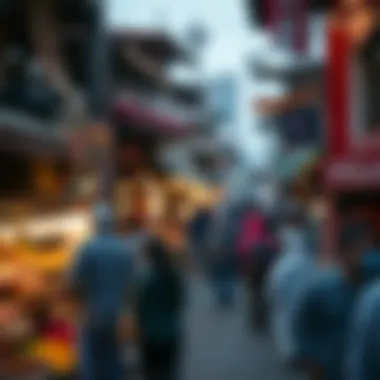
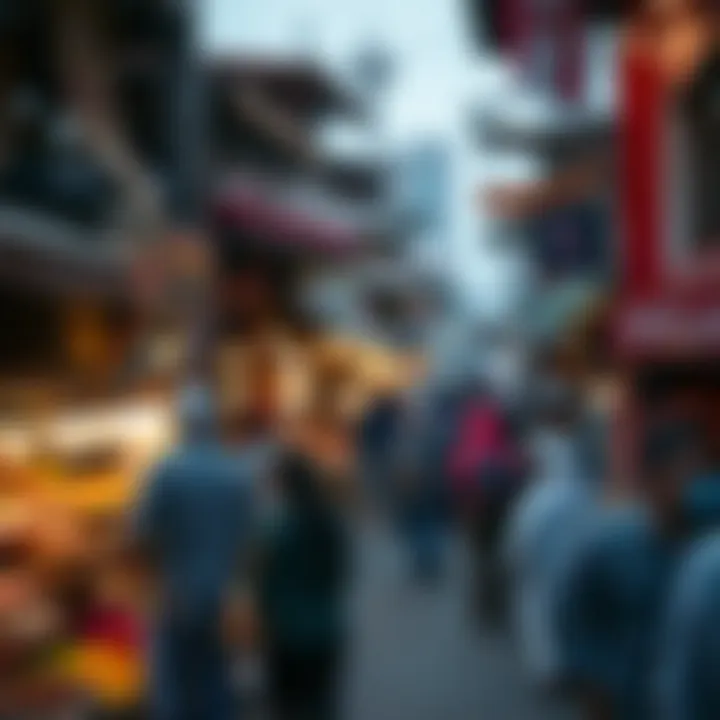
- Mosque Organised Iftars: Many mosques prepare meals for worshippers, often in large tents. This initiative allows people from different backgrounds and cultures to share in the act of breaking their fast.
- Public Parks and Open Areas: Some community centers and parks such as Al Barsha Pond Park host large iftar gatherings. It’s a chance for families to mingle and create connections.
- World Food Programme Initiatives: Dubai's participation in campaigns to feed the less fortunate during Ramadan has led to many organized iftar meals where locals and expats come together to contribute.
These community gatherings foster a sense of belonging, inviting participants to reflect on the importance of compassion and generosity during this holy month. The joy of breaking fast with others reinforces the idea of unity.
“Breaking bread together cultivates bonds and reminds us of our shared humanity, a central tenet during Ramadan.”
Iftar and Tourism in Dubai
When one thinks of tourism in Dubai, the mind often conjures images of towering skyscrapers, lavish shopping malls, and pristine beaches. Yet, during the month of Ramadan, another facet emerges—Iftar. This communal meal held after sunset to break the fast serves not just a spiritual purpose but also enriches the tourism experience. From engaging cultural practices to delectable culinary offerings, Iftar becomes an essential part of the visitor’s journey during this sacred month.
Ramadan as a Time for Visiting
Ramadan transforms Dubai into a city of unity, reflection, and hospitality. Tourists visiting during this period find themselves enveloped in a unique atmosphere that is both vibrant and serene. The streets, adorned with Ramadan decorations and illuminated by festive lights, create a visually striking backdrop for evening meals.
Visitors can engage in authentic cultural experiences, such as attending prayers at historic mosques or joining in community events. The open invitation to partake in Iftar meals fosters a welcoming environment, encouraging interaction between locals and tourists. Instead of merely being passive observers, tourists can immerse themselves in lively discussions about traditions and customs.
Many travelers seize this opportunity to understand the significance of Ramadan. It offers a chance to witness the spiritual dedication of the local community and to celebrate this month-long journey together. As the sun dips below the horizon, tourists gather with locals at Iftar tables, bringing a sense of inclusion and warmth. This merging of cultures is a mainstay of Dubai’s tourism.
Tourist-Friendly Iftar Options
When it comes to options for Iftar, Dubai does not disappoint. From luxurious hotel buffets to charming community gatherings, there is a wide array for both travelers and residents. Leading hotels often set up lavish Iftar spreads, where guests are treated to a feast featuring both local and international dishes. Examples include:
- Ritz-Carlton Dubai offers an extravagant buffet with traditional dish options and lovely views of the Arabian Gulf.
- Nobu at Atlantis The Palm presents a fusion of Japanese-Peruvian flavors tailored specifically for Ramadan.
For those looking for a more communal experience, local neighborhoods often organize open-air Iftar gatherings in parks or community centers. These humble setups allow for a more authentic feel, where visitors may interact with expats and locals alike. More casual alternatives like Al Mallah and Sufra are known for serving delicious and affordable meals that feature staple dishes popular during Ramadan.
Moreover, Dubai’s food delivery services also step up their game, offering Iftar packages that can be enjoyed in the comfort of one’s accommodation. Many establishments get creative by placing special emphasis on healthy options like fresh juices, dates, and salads, providing a well-rounded meal for those breaking their fast after a long day.
Through these various offerings, Iftar becomes not only a meal but also a valuable experience that reveals the heart of Dubai’s cultural diversity. It invites tourists to taste the flavors of Ramadan while fostering an appreciation for the traditions that make this city truly unique.
"Iftar represents more than just breaking a fast; it embodies the spirit of community, hospitality, and cultural exchange."
As one navigates the landscape of Dubai during Ramadan, it becomes clear that Iftar is as much about sustenance as it is about creating connections—between cultures, communities, and individuals.
Vibrancy of Dubai's Iftar Scene
Iftar in Dubai goes beyond mere meals; it’s a thriving cultural phenomenon embodying the spirit of Ramadan. The vibrancy of Dubai's iftar scene showcases how diverse influences meld together to create a dynamic tapestry of traditions, flavors, and social connections. This section dives deep into the symphony of experiences that characterize iftar. From expatriates sharing their unique traditions to locals embracing a blend of the sacred and the contemporary, the scene reflects both community and individuality.
The Influence of Expat Communities
Dubai is often described as a melting pot, and this is profoundly evident during Ramadan and its iftar gatherings. Expat communities contribute rich flavors and festive practices that blend seamlessly with Emirati traditions. You’ll find people from all corners of the world bringing their culinary habits to the table.
For instance, a family from Lebanon may serve up their famous fattoush salad alongside a traditional lamb biryani from a local household. This cultural exchange has given rise to unique iftar experiences that celebrate global diversity.
**"In Dubai, iftar becomes a living canvas where different cultures paint their stories with food, laughter, and friendship."
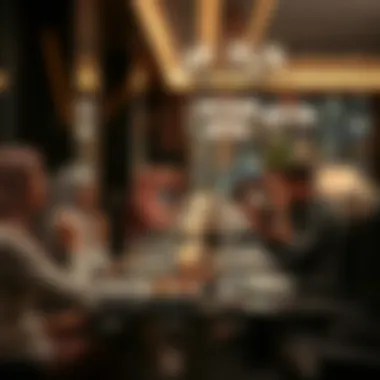
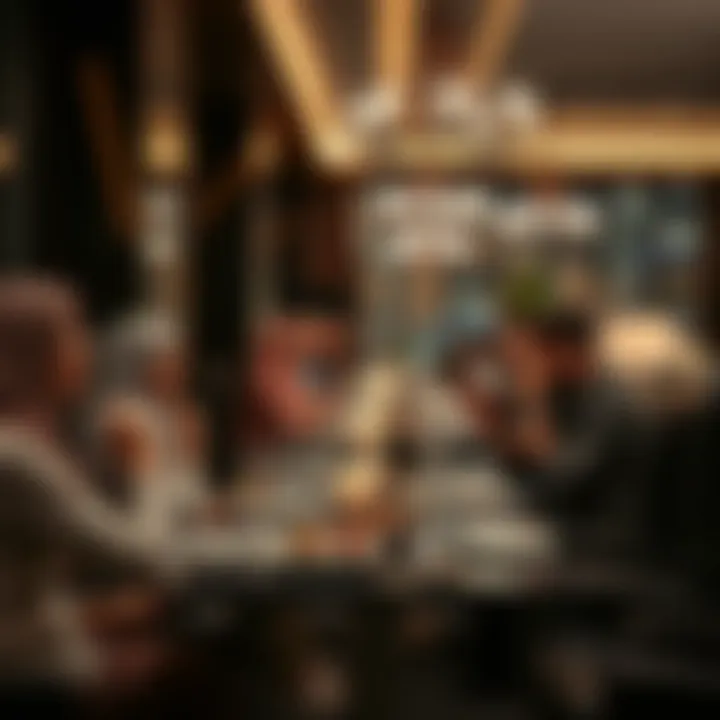
Aspiring chefs and home cooks from various backgrounds often hold pop-up iftar events, making it a communal celebration of sorts. There's a certain buzz as people explore new flavor combinations, learning about the traditions behind each dish. This mélange allows expatriates not only to showcase their heritage but also to foster connections with the local community, creating an atmosphere of shared understanding.
Social Aspects of Breaking Fast Together
Iftar is inherently a communal event, but in Dubai, its social significance is especially pronounced. Families come together, friends reconnect, and often, strangers even forge new friendships over the iftar meal. The act of breaking bread takes on a profound depth when shared with others, highlighting themes of solidarity and unity.
In many high-rise hotels and lavish restaurants, communal tables are set up to enhance the experience. Large platters are placed at the center, encouraging guests to share and partake together. This not only makes dining more intimate but also fosters conversations that may never happen in smaller settings.
Moreover, community events are frequently organized, where long tables invite anyone and everyone to join. Such gatherings are often hosted at traditional heritage sites, helping not just to celebrate the season but also to reinforce a sense of belonging and community. Creating a welcoming environment for all is essential, making those participating feel valued and included. It’s a reminder that during this sacred month, the primary aim should be to foster companionship and understanding.
Considerations for Iftar Guests
Understanding the nuances of Iftar is essential for both locals and visitors in Dubai. The evening meal that breaks the fast is steeped in cultural importance. Thus, there are essential considerations one must keep in mind when attending an Iftar gathering.
Cultural Sensitivity and Etiquette
Attending Iftar is not just about food; it's a reflection of respect for tradition and cultural norms. Cultural sensitivity is paramount. When you're invited to an Iftar, it’s courteous to dress modestly, respecting the cultural context of Ramadan. This is a month of reflection and prayers, so showing respect through your attire is a sign of goodwill.
Arriving punctually is another important aspect. The meal begins at sunset, and there’s a certain anticipation in the air as people gather to break their fast. It is customary to start with a date and some water, a traditional practice rooted in the teachings of the Prophet Muhammad. Everyone may be eager to dig in, but waiting until everyone is present demonstrates consideration for the host and fellow guests, capturing the essence of community.
Moreover, it's wise to observe how others partake in the meal. Be mindful of the seating arrangements; some may prefer specific dietary customs, such as halal food. Engaging in polite conversation and avoiding controversial topics will pave the way for a warm atmosphere, reinforcing the bonds that Ramadan fosters.
"Iftar isn’t just a meal; it’s a communal experience that enhances relationships and reinforces cultural connection."
Reservation Practices for Iftar
As more people embrace the opportunity to enjoy Iftar in public venues, making reservations has become a common practice. Many upscale restaurants offer lavish Iftar buffets, attracting both locals and tourists. However, it’s important to remember that demand often exceeds supply during Ramadan.
To avoid disappointment, it’s advisable to book your table in advance—especially at popular establishments known for their unique Iftar experiences. Online reservation platforms and direct calls to restaurants are useful tools. This ensures you can secure a spot at hot spots including the Burj Al Arab or the Atlantis, where the Iftar is nothing short of spectacular.
In addition, consider choosing off-peak hours. Restaurants can be extremely busy just as sunset approaches, making it hard to enjoy the ambiance or engage in meaningful conversation. By reserving for a bit later in the evening, you might find a more relaxed environment, allowing for deeper connections with your table companions.
Ultimately, planning ahead not only enhances your dining experience but respects the efforts of those preparing for this significant meal.
The End: The Essence of Iftar in Dubai Today
Iftar in Dubai stands as a vibrant mosaic, intricately woven with threads of tradition, culture, and culinary excellence. This concluding section is a reflection on how iftar embodies both the rich heritage of the Muslim faith and the dynamic, ever-evolving nature of Dubai society. The significance of iftar extends beyond mere sustenance; it represents a spiritual and communal rebirth each evening during Ramadan.
Reflecting on Tradition and Modernity
The practice of breaking fast at sunset is as old as Ramadan itself. It is rooted in the teachings of Islam, inviting the faithful to pause and reflect. In Dubai, this tradition is beautifully intertwined with modernity. Expatriates and locals come together, showcasing a remarkable blend of cultural practices.
For many, the evening meal at iftar transcends the act of eating; it’s a communal event that fosters connections across diverse cultures. Families gather around tables adorned with a medley of dishes, bridging culinary customs from various backgrounds. The traditional dates and water, often served first, symbolize hospitality and warmth, serving as the foundation for the more elaborate meals that follow.
Communities often engage in shared meals, enhancing bonds and creating a sense of oneness. These gatherings promote an atmosphere where stories and laughter echo against the backdrop of Dubai’s iconic skyline, beautifully lit at dusk. In recent years, hotels and restaurants have embraced new concepts, transforming the iftar experience adding a contemporary spin to traditional recipes. Visitors find everything from lavish buffets featuring Middle Eastern delicacies to creative fusion interpretations that showcase Dubai’s culinary innovation.
“Iftar is not just about breaking the fast; it’s about coming together, sharing moments, and embracing the essence of Ramadan.”
The vibrancy of Dubai’s iftar scene is further colored by its expat communities, each contributing their flavors and customs. This blending of backgrounds creates an enriching environment where people celebrate their unique heritages while immersing themselves in the local culture. Whether it's a casual gathering in a modest home or a sumptuous banquet in a luxury venue, the heart of iftar continues to beat strongly in Dubai, drawing people from all walks of life.
Ultimately, iftar in Dubai today serves as a reminder of how tradition can coexist harmoniously with modern influences. It encourages everyone, irrespective of their background, to partake in the spirit of Ramadan, fostering understanding and respect among diverse groups. As each sunset during this holy month, Dubai showcases not only its culinary prowess but also its commitment to community, compassion, and unity—core principles that resonate in the heart of this cosmopolitan city.


